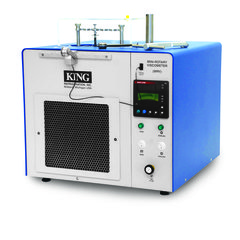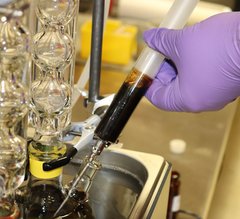CEC L-105 and L-109 Oxidation Testing
 Savant Author: Canika Owen-Robinson, New Business Integration Leader
Savant Author: Canika Owen-Robinson, New Business Integration Leader
In our continuing efforts to meet our customers' needs, Savant has added CEC L-105 Low-Temperature Pumpability and CEC L-109 Oxidation Test for Engine Oils Operating In The Presence Of Biodiesel Fuel. Emphasis on sustainability continues to drive the use of increased biodiesel components in diesel fuel blends, increasing the potential risk of engine oil degradation due to biodiesel contamination.
Oxidation can lead to oil degradation, resulting in increases in viscosity, acid number, and/or sludge and deposit tendencies:
- An increase in viscosity can lead to increased friction and lower wear prevention, which can reduce efficiency and increase wear.
- An increase in acid number can lead to the formation of undesirable gums and lacquers.
- Sludge enhances corrosion rates due to acidic compounds, which can lead to valve malfunctioning, confined space blocking, or orifice clogging.
CEC L-105 Low-Temperature Pumpability Test
 After the series of engine failures caused by oil starvation at low temperatures in 2008-2009, it was decided a new test was needed to determine if an oil maintains its pumpability when diluted with biodiesel and degraded by oxidation. CEC L-105 determines the low-temperature pumpability (as measured by MRV) of engine oil dosed with biofuel and aged in the presence of an iron catalyst used to accelerate the rate of reaction. The lubricant is heated at 150°C and aerated under controlled conditions for three days. Lubricant performance is evaluated by the degree of viscosity increase and yield stress on the degraded oil as measured by MRV (D4684). The capability to regulate low-temperature viscosity is a vital performance measure in lubricants. Appropriate control of cold temperature viscosity can diversify running temperature ranges, provide excellent oil pumpability, and improve the protection of engine parts. The L-105 test simulates the ability of an oil to maintain these important performance attributes over time.
After the series of engine failures caused by oil starvation at low temperatures in 2008-2009, it was decided a new test was needed to determine if an oil maintains its pumpability when diluted with biodiesel and degraded by oxidation. CEC L-105 determines the low-temperature pumpability (as measured by MRV) of engine oil dosed with biofuel and aged in the presence of an iron catalyst used to accelerate the rate of reaction. The lubricant is heated at 150°C and aerated under controlled conditions for three days. Lubricant performance is evaluated by the degree of viscosity increase and yield stress on the degraded oil as measured by MRV (D4684). The capability to regulate low-temperature viscosity is a vital performance measure in lubricants. Appropriate control of cold temperature viscosity can diversify running temperature ranges, provide excellent oil pumpability, and improve the protection of engine parts. The L-105 test simulates the ability of an oil to maintain these important performance attributes over time.
CEC L-109 Oxidation Test for Engine Oils Operating in the Presence of Biodiesel Fuel
 Numerous engine and bench tests have been developed over the years to determine the effects of lubricant oxidation. However, engine tests are expensive to run and include many variables and interactions, making it difficult to isolate the impact of specific degradation mechanisms such as oxidation. The CEC L-109 test is a lab-scale oxidation method that ages oil dosed with biodiesel fuel under carefully controlled conditions in laboratory glassware. Like CEC L-105, fresh diesel engine oil is treated with biodiesel in the presence of an iron catalyst used to accelerate the rate of reaction. The sample is heated to 150°C and aerated under controlled conditions for 216 hours. At 72, 144, 168, and 216 hours end of test (EOT), sample aliquots are taken. The viscosity increases are measured by comparing ASTM D445 Kinematic Viscosity (100°C) values for the intermediate and EOT samples to the starting oil/fuel start of test (SOT) mixture. Oxidation is measured via DIN 51 453 FTIR (peak height area increase) for the same sample pairs.
Numerous engine and bench tests have been developed over the years to determine the effects of lubricant oxidation. However, engine tests are expensive to run and include many variables and interactions, making it difficult to isolate the impact of specific degradation mechanisms such as oxidation. The CEC L-109 test is a lab-scale oxidation method that ages oil dosed with biodiesel fuel under carefully controlled conditions in laboratory glassware. Like CEC L-105, fresh diesel engine oil is treated with biodiesel in the presence of an iron catalyst used to accelerate the rate of reaction. The sample is heated to 150°C and aerated under controlled conditions for 216 hours. At 72, 144, 168, and 216 hours end of test (EOT), sample aliquots are taken. The viscosity increases are measured by comparing ASTM D445 Kinematic Viscosity (100°C) values for the intermediate and EOT samples to the starting oil/fuel start of test (SOT) mixture. Oxidation is measured via DIN 51 453 FTIR (peak height area increase) for the same sample pairs.
All newly-formulated engine oils that claim against the ACEA oil sequences must obtain the relevant pass criteria for CEC L-105 and CEC L-109 (this includes ACEA A3/B3, A3/B4, A5/B5, C1, C2, C3, C4, C5, E4, E6, E7, and E9).
Several ASTM methods may be used to determine or evaluate the oxidation stability of an oil, such as RPVOT D2272, D943, D4310, FTIR D7414, TFOUT D4742, and D942 oxidation stability for greases. In addition to these standard test methods, Savant Labs can combine customized Tannas Quantum® oxidation in-test sampling (the extraction technique) and FTIR or GC/MS to monitor the depletion of anti-oxidants in oil, providing powerful information on the life span of these lubricants. If a lubricant shows ability to resist degradation in these bench tests, it can indicate its ability to provide longer oil life and better protection.
The technical teams at Savant have a deep understanding of oxidation testing. We can help you define a test slate and analyze the data in a concise and understandable format. Contact us for more information or request a quote for your next oxidation testing project.
